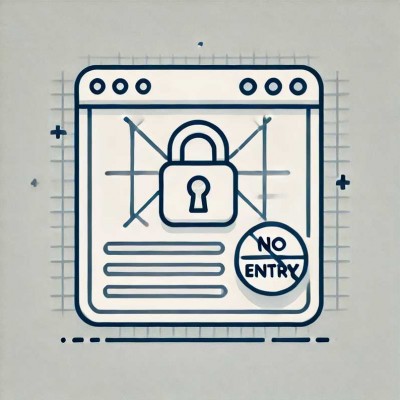надо срочно сюда
что-нибудь добавить
Новинки за декабрь 2025 года: 404 страница и лог ее посещений, Новогодний персонаж, SEO FAQ с поддержкой JSON-LD и Microdata, Коммерческое предложение в PDF.

Закрытие сайта на время разработки — это важный шаг, который позволяет вам избежать множества проблем с индексацией, нежелательными визитами и преждевременным накоплением дублированного или некачественного контента. Давайте разберем подробнее, зачем закрывать сайт от индексирования и какие преимущества это приносит.
1. Избежание индексации тестового содержимого
При разработке сайта контент и структура страниц часто остаются неполными, а некоторые элементы дизайна и функционала могут работать некорректно. Если поисковые системы начинают индексировать такой «сырой» сайт, существует риск, что они запомнят ошибки и пустые страницы. Это может отрицательно повлиять на видимость сайта в поисковых системах в будущем. Пример:
2. Защита от формирования неправильного представления о сайте
Когда поисковая система находит и сканирует ваш сайт, она строит на основе его содержимого представление о том, какие страницы показывать в результатах поиска, и как они должны оцениваться. Сайт в процессе разработки может иметь множество незавершенных страниц или даже тестовых данных, которые не имеют отношения к реальному контенту. В результате:
3. Защита от нежелательных посетителей
Открытый, но недоработанный сайт может привлечь внимание не только поисковых систем, но и реальных пользователей. Они могут попасть на сайт случайно или в результате тестирования вами различных маркетинговых инструментов. Неполный сайт часто вызывает у пользователей разочарование и приводит к негативным отзывам. Также есть риск, что:
Ограничив доступ к сайту, вы можете сосредоточиться на его доработке, не беспокоясь о случайных визитах.
Какой метод закрытия сайта выбрать?
Для закрытия сайта от индексации можно использовать различные методы, которые помогут избежать вышеперечисленных проблем. Важно выбирать метод, который наилучшим образом подойдет именно вам:
Закрытие магазина встроенными средствами Опенкарт
Система > Настройки > Магазин > Сервер > Режим обслуживания.После активации режима технического обслуживания все пользователи будут видеть сообщение о том, что сайт временно недоступен. В то же время, администратор сможет продолжить работу над сайтом.
Закрытие с помощью robots.txt
robots.txt например в robots1.txtrobots.txtUser-agent: * Disallow: /* User-agent: Yandex Disallow: /*
Эта запись запрещает всем поисковым роботам (и отдельно Яндексу) индексировать весь сайт. Как только вы закончите настройку и протестируете сайт, измените или удалите эти строки, чтобы позволить поисковым системам начать индексирование вашего магазина.
Закрытие с помощью .htaccess с паролем.
Файл .htaccess позволяет ограничить доступ к сайту, используя пароль. Таким образом, только пользователи, знающие логин и пароль, смогут зайти на сайт.
.htaccess например в .htaccess1.htaccessAuthType Basic AuthName "Restricted Access" AuthUserFile /path/to/.htpasswd Require valid-user
AuthUserFile – это путь к файлу .htpasswd, в котором хранится логин и хэш пароля. Создайте этот файл и добавьте в него логин и пароль с помощью специальных утилит, например, онлайн-генераторов .htpasswd. Также некоторые хостинги позволяют сделать это в панели управления.htpasswd корректен..htpasswd, что может вызвать трудности у новичков.
Закрытие с помощью .htaccess по ip
Файл .htaccess позволяет ограничить доступ к сайту по ip пользователя.
.htaccess например в .htaccess1.htaccessOrder deny,allow deny from all Allow from 1.1.1.1
1.1.1.1 это ваш ip. Узнать ip вы можете, к примеру зайдя на страницу Яндекса..htpasswd корректен..htpasswd
Закрытие с помощью мета-тегов noindex и nofollow для определенных страниц.
В OCStore уже есть встроенные настройки для добавления таких тегов у товаров, категорий и служебных страниц. Это удобно для закрытия отдельных страниц магазина.
Закрытие сайта на время разработки — это важный шаг, который позволяет вам избежать множества проблем с индексацией, нежелательными визитами и преждевременным накоплением некачественного контента.